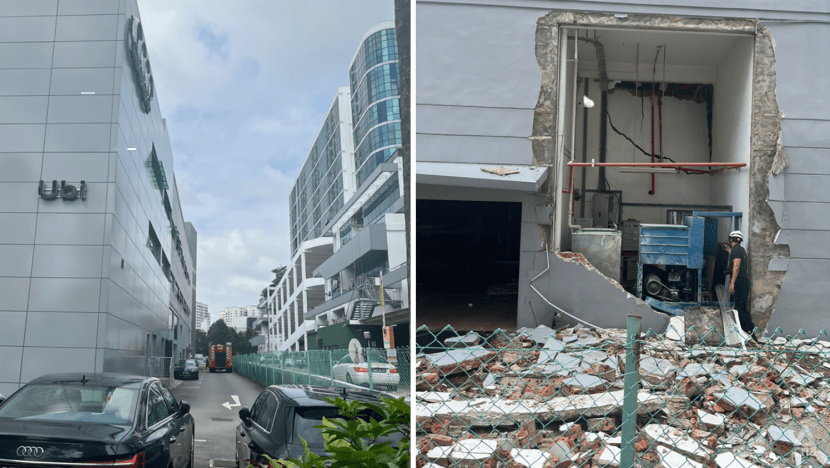Premium Automobiles fined S$12,000 over 2023 explosion at Audi service centre in Ubi
The company had installed a waste oil tank in a machine room, which later released flammable vapours that reacted with electrical sparks produced during the operation of a lift, resulting in the blast.

The aftermath of an explosion at the Audi service centre at 55 Ubi Road 1 on Mar 7, 2023. (Photos: CNA/Clara Lee)

This audio is generated by an AI tool.
SINGAPORE: A car company behind an explosion that tore through the wall of the Audi service centre in Ubi in 2023 was fined SS$12,000 (US$9,350) on Wednesday (Sep 10).
The blast on Mar 7, 2023 had been caused by the reaction between electric sparks produced from the use of a lift and flammable vapours released from a waste oil tank placed within the lift's machine room.
It resulted in the evacuation of 100 people, with one taken to hospital. The fire had burnt out by the time firefighters arrived.
Premium Automobiles pleaded guilty to one charge under the Building Maintenance and Strata Management (Lift, Escalator and Building Maintenance) Regulations, for using the lift in a dangerous manner, and failing to stop its operation immediately when it was used in such a manner.
A Building and Construction Authority (BCA) prosecuting officer said that Premium Automobiles had been the lessee and occupant of the premises at 55 Ubi Road 1 since 2002.
It was the owner of the hydraulic lift. A machine room containing the lift motor, located on the ground floor near the lift shaft, was an integral part of the lift.
After receiving a report of the explosion in the lift's machine room on Mar 7, 2023, BCA engineers visited the premises and saw that a non-structural brick wall in the machine room had collapsed.
On Mar 20, 2023, two of the BCA engineers returned to inspect the machine room and observed that in addition to the lift motor that controls the movement of the lift, there was a metallic object that had been placed near the lift motor and the wall.
They found that this metallic object was a waste oil tank, installed by the company in 2002 within the machine room.
The waste oil tank received waste oil from the motor vehicles poured into pipes from the second and third levels of the building. This waste oil would be periodically collected by a waste oil contractor for disposal when the tank, with a capacity of 2,160L, was full.
Since 2002, Premium Automobiles had engaged East Elevators as a lift service contractor for services such as monthly repairs and maintenance. However, the company did not tell East Elevators about the installation of the waste oil tank.
East Elevators had assumed that the metallic object was non-hazardous.
According to the Singapore Civil Defence Force, the blast was caused by electric sparks from the relay switch in the control panel in the machine room, which ignited flammable vapours released from the waste oil tank there.
Electrical sparks would be produced when the lift begins to move during operations.
The resulting blast damaged the brick walls near the machine room, the lobby, and the lift landing doors.
A man, who was not identified in court documents, had been using the lift when the explosion happened. However, he was not injured.
A representative of the company was present in court to plead guilty on behalf of Premium Automobiles. He declined to be named or comment when subsequently approached by reporters.
A BCA prosecuting officer said the explosion caused sizeable property damage.
"Considering the extent of the property damage caused, the explosion could have resulted in significant injuries had there been persons near the machine room or the lift lobby," he said.
BCA added that the company had a high culpability as it authorised the installation of the waste oil tank in the machine room and failed to consult the relevant authorities on the requirements.
The prosecution sought a fine of S$12,000.
In mitigation, the representative said that the company had relied mistakenly on a service engineer for the lift matters.
District Judge Kamala Ponnampalam replied that instead of "looking back", the company's strongest mitigating factor was the steps it will take moving forward, such as taking a "closer look" at its measures.
The prosecution similarly replied that although the company had relied on a professional engineer, the obligation was still on the owner to ensure that the lift was operational.
Judge Ponnampalam said that it was "purely fortuitous" that no one was seriously harmed.
Taking reference from the prosecution's calibration of the harm caused and the company's culpability, Judge Ponnampalam imposed the fine it sought.
An owner of a lift who operates it in a dangerous way can be jailed for up to 12 months, or fined up to S$20,000, or both. As the accused in this case is a company, only the fine applies.














